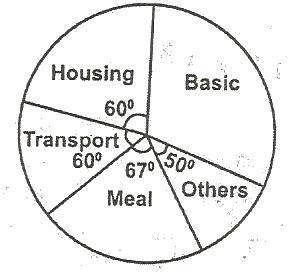A binary operation x is defined by a x b = a\(^b\). If a x 2 = 2 - a, find the possible values of a?
1, -2
2, -1
2, -2
1, -1
Correct answer is A
a = b = a\(^2\)
a + 2 = a\(^2\).....(i)
a + 2 = 2 - a..............(ii)
a\(^2\) = 2 - a
a\(^2\)+ a - 2 = a\(^2\) + a - 2 = 0
= (a + 2)(a - 1) = 0
a = 1 or - 2
Find the value of x if \(\frac{\sqrt{2}}{x + \sqrt{2}}\) = \(\frac{1}{x - \sqrt{2}}\)
3\(\sqrt{2}\) + 4
3\(\sqrt{2}\) - 4
3 - 2\(\sqrt{2}\)
4 + 2\(\sqrt{2}\)
Correct answer is A
\(\frac{\sqrt{2}}{x + 2}\) = x - \(\frac{1}{\sqrt{2}}\)
x\(\sqrt{2}\) (x - \(\sqrt{2}\)) = x + \(\sqrt{2}\) (cross multiply)
x\(\sqrt{2}\) - 2 = x + \(\sqrt{2}\)
= x\(\sqrt{2}\) - x
= 2 + \(\sqrt{2}\)
x (\(\sqrt{2}\) - 1) = 2 + \(\sqrt{2}\)
= \(\frac{2 + \sqrt{2}}{\sqrt{2} - 1} \times \frac{\sqrt{2} + 1}{\sqrt{2} + 1}\)
x = \(\frac{2 \sqrt{2} + 2 + 2 + \sqrt{2}}{2 - 1}\)
= 3\(\sqrt{2}\) + 4
x > -\(\frac{1}{6}\)
x > 0
0 < x < 6
0 < x <\(\frac{1}{6}\)
Correct answer is A
\(\frac{1}{3x}\) + \(\frac{1}{2}\)x = \(\frac{2 + 3x}{6x}\) > \(\frac{1}{4x}\)
= 4(2 + 3x) > 6x = 12x\(^2\) - 2x = 0
= 2x(6x - 1) > 0 = x(6x - 1) > 0
Case 1 (-, -) = x < 0, 6x - 1 > 0
= x < 0, x < \(\frac{1}{6}\) (solution)
Case 2 (+, +) = x > 0, 6x - 1 > 0 = x > 0
x > \(\frac{1}{6}\)
Combining solutions in cases (1) and (2)
= x > 0, x < \(\frac{1}{6}\) = 0 < x < \(\frac{1}{6}\)

N2,050
N2,600
N3,100
N3,450
Correct answer is A
360\(^o\) - (60\(^o\) + 60\(^o\) + 67 + 50 = 237\(^o\))
360\(^o\) - 237 = 130\(^o\)
B. Salary = \(\frac{123}{360} X \frac{N6000}{1}\)
= N2,050
Find the simple interest rate percent annum at which N1000 accumulates to N1240 in 3 years.
6%
8%
10%
12%
Correct answer is B
I = \(\frac{PRT}{100}\) = 1 = 1240 - 1000 = 240
R = \(\frac{240 \times 100}{100 \times 3}\) = 8%
JAMB Subjects
Aptitude Tests